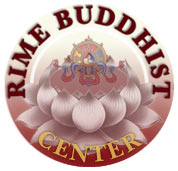Join us as we explore the rich repository of Buddhist Sutras, both Pali Canon and Tibetan Kangyur every first Sunday of the month after the Sunday Service. Sūtra (Pali. sutta) means ‘something that was heard from someone else’ and usually connotes ‘a discourse’. In this famous scripture, known popularly as The Heart Sūtra, the Buddha Śākyamuni inspires his senior monk Śāriputra to request instructions from the bodhisattva Avalokiteśvara on the way to practice the perfection of wisdom. Avalokiteśvara then describes how an aspiring practitioner of the perfection of wisdom must first understand how all phenomena lack an intrinsic nature, which amounts to the realization of emptiness. Next, Avalokiteśvara reveals a brief mantra that the practitioner can recite as a method for engendering this understanding experientially. Following Avalokiteśvara’s teaching, the Buddha offers his endorsement and confirms that this is the foremost way to practice the perfection of wisdom.
Facilitators: Lama Matthew Rice (Lobpön Palden Gocha) and Daniel Scharpenburg
Text: The Heart of the Perfection of Wisdom, the Blessed Mother
Join us as we explore the rich repository of Buddhist Sutras, both Pali Canon and Tibetan Kangyur every first Sunday of the month after the Sunday Service. Sūtra (Pali. sutta) means ‘something that was heard from someone else’ and usually connotes ‘a discourse’. The Karaniya Metta Sutta is a Buddhist scripture that teaches the practice of loving-kindness (metta). It is one of the most well-known and widely practiced suttas in Buddhism. The sutta begins with the Buddha describing the benefits of metta and then goes on to describe how to practice metta.
We will also be having a potluck, so please bring a vegetarian dish to share.
Facilitators: Lama Matthew Rice (Lobpön Palden Gocha) and Daniel Scharpenburg
Text: Karaniya Metta Sutta
Join us as we explore the rich repository of Buddhist Sutras, both Pali Canon and Tibetan Kangyur every first Sunday of the month after the Sunday Service. Sūtra (Pali. sutta) means ‘something that was heard from someone else’ and usually connotes ‘a discourse’. The sutta starts off by describing how the Buddha passes through the village of Kesaputta and is greeted by its inhabitants, a clan called the Kalamas. They ask for his advice: they say that many wandering holy men and ascetics pass through, expounding their teachings and criticizing the teachings of others. So whose teachings should they follow? He delivers in response a sermon that serves as an entry point to the Dhamma, the Buddhist teachings for those unconvinced by mere spectacular revelation.
We will also be having a potluck, so please bring a vegetarian dish to share.
Facilitators: Lama Matthew Rice (Lobpön Palden Gocha) and Daniel Scharpenburg
Text: Kalama Sutta
Join us as we explore the rich repository of Buddhist Sutras, both Pali Canon and Tibetan Kangyur every first Sunday of the month after the Sunday Service. Sūtra (Pali. sutta) means ‘something that was heard from someone else’ and usually connotes ‘a discourse’. In this very short sūtra, the Buddha explains to a nāga king and an assembly of monks that reciting the four aphorisms of the Dharma is equivalent to recitation of all of the 84,000 articles of the Dharma. He urges them to make diligent efforts to engage in understanding the four aphorisms (also called the four seals), which are the defining philosophical tenets of the Buddhist doctrine.
We will also be having a potluck, so please bring a vegetarian dish to share.
Facilitators: Lama Matthew Rice (Lobpön Palden Gocha) and Daniel Scharpenburg
Text: The Questions of the Nāga King Sāgara

